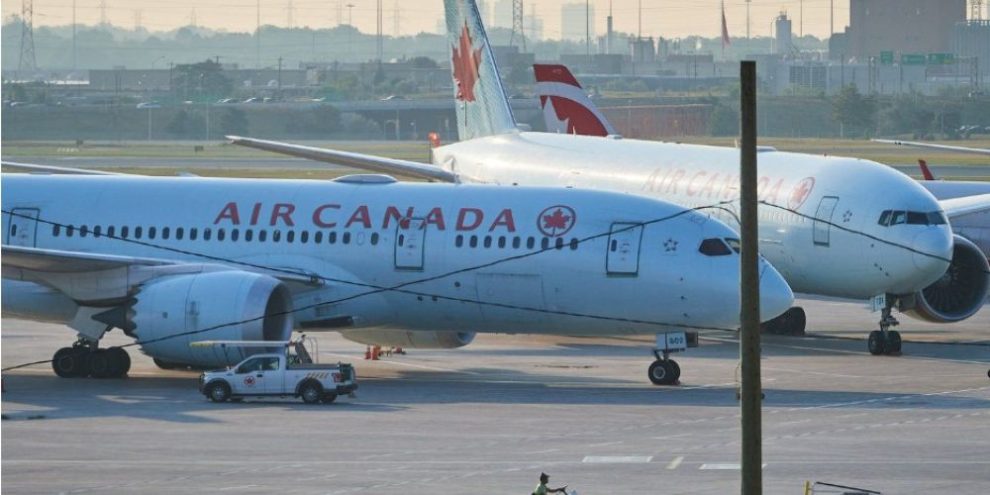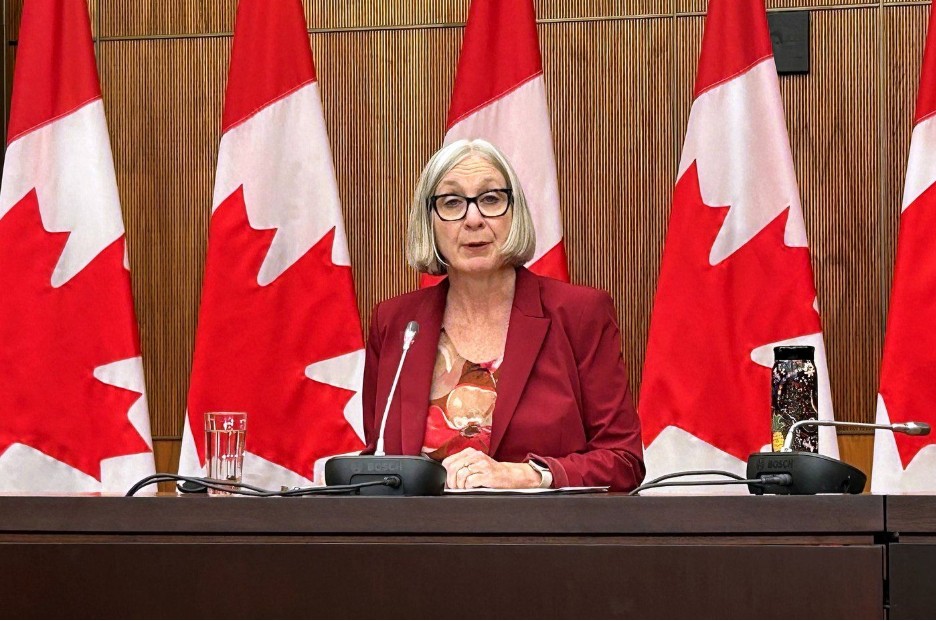
Updated August 16, 2025 @ 7:23pm
The federal Liberal government is defending its decision to intervene to resolve a labour dispute at Canada's largest airline amid criticism from unions and opposition parties that the move sides with big business.
Jobs Minister Patty Hajdu said Saturday that she directed the Canada Industrial Relations Board to order Air Canada and the union representing its flight attendants to resume operations and resolve the dispute through binding arbitration.

Hajdu said she made the call after meeting with both sides Friday night, finding that talks had broken down and the parties remained too far apart to resolve the conflict quickly enough.
"Now is not the time to take risks with our economy. A work stoppage would cause thousands of Canadians to be stranded abroad and across this country and this is simply unacceptable," Hajdu said at a news conference in Ottawa on Saturday. "This is not a decision I have taken lightly, but the potential for immediate negative impact on Canadians and our economy is simply too great."
The move came on the first day of a strike by Air Canada's flight attendants and amid intense pressure from business groups to resolve the labour disruption that threatened an economy already reeling from the economic toll of U.S. President Donald Trump's trade war.
The Canadian Union of Public Employees, which represents the flight attendants, along with federal political parties fired off shots at the government for stepping in, arguing the move upends the union's collective bargaining abilities.
Wesley Lesosky, head of the Air Canada Component of CUPE, accused the Liberals of "talking out of both sides of their mouths" by intervening after saying the best place to reach a deal is at the bargaining table.
"The Liberals are violating our Charter rights to take job action and give Air Canada exactly what they want: hours and hours of unpaid labour from underpaid flight attendants, while the company pulls in sky-high profits and extraordinary executive compensation," Lesosky said in a statement to media.
Conservative labour critic Kyle Seeback said in a statement that Prime Minister Mark Carney is showing he is "no friend to workers" and would "rather reward his corporate buddies" than help the flight attendants in their struggle for fair compensation.
“No worker — federally-regulated or otherwise — should be forced, especially by the government, to work without being paid," Seeback said. "Yet, that is exactly what flight attendants are being ordered to do."
Air Canada cancelled more than 600 flights over the past two days in preparation for a potential work stoppage, and Hajdu said it could be days before service returns to normal.
Matthew Holmes, head of public policy for the Canadian Chamber of Commerce, warned nearly a million Canadians could be affected by the travel disruptions.
“With both parties declaring an impasse in negotiations, with valuable cargo grounded and passengers stranded, the government made the right decision to refer the two sides to binding arbitration," Holmes said.
Hajdu said the cancelled flights have already been causing "significant harm" to the economy and the disruptions are negatively affecting travelling Canadians and the national economy.
She pointed to labour disruptions last year that had a "massive" impact on the entire economy. Those included a major rail strike involving CN Rail and CPKC and port strikes in Montreal and Vancouver that disrupted supply chains.
Ottawa had intervened in those instances in the same way, by invoking Section 107 of the Labour Code that lets the minister refer disputes to the labour board to enforce industrial peace.
Unifor, Canada’s largest private-sector union, said the government's decision in the Air Canada dispute tells federally regulated employers not to bother bargaining fairly because the government will step in.
“My message to these same federal employers, many of whom Unifor also bargains with, is to consider hard on what you are sowing, because here’s the truth: suppressing the rights of workers will never bring you labour peace,” Unifor National President Lana Payne said in a statement Saturday.
Interim NDP Leader Don Davies posted on social media that this is a "blatant misuse" of Section 107 and called for the Liberals to "recall Parliament and democratically debate back-to-work legislation, if they feel it’s justified."
The union, which represents more than 10,000 flight attendants with Air Canada, had announced its members were walking off the job after it was unable to reach an eleventh-hour deal with the airline, following some eight months of negotiations.
The strike officially began just before 1 a.m. ET on Saturday and in turn, Air Canada locked out its agents about 30 minutes later due to the strike action.
Ottawa announced it would step in just under 12 hours after the strike officially began, and just a day after Hajdu said she saw signs there might be a path forward for the two sides.
The minister said her optimism quickly faded after a "disappointing" meeting with both parties on Friday night.
"I asked them to continue to meet throughout the night. The mediators were there assisting the parties, and this morning the information that I received from the mediators is that the parties were still very far apart on a number of key issues," Hajdu said.
"It was clear that there was an impasse, and impasse means that there obviously is a need for additional assistance, and I believe the (labour board) is the best place to help them."
The minister has ordered the labour board to extend the term of the existing collective agreement until the arbitrator produces a new one.
This report by The Canadian Press was first published Aug. 16, 2025.





